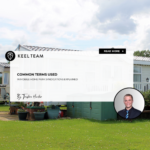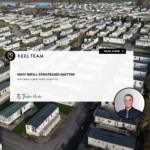Hidden Costs of Mobile Home Park Investing: What Investors Overlook
-
 Tristan Hunter - Investor Relations
Tristan Hunter - Investor Relations

Mobile home park investing can offer steady income and long-term growth potential. However, many investors do not see the hidden costs that come with ownership. While historically lower acquisition costs and high demand for affordable housing make mobile home parks attractive, unexpected expenses can impact potential profitability. From infrastructure upgrades to tenant turnover, these costs can add up quickly.
1. Infrastructure Upgrades: The Biggest Hidden Expense of Mobile Home Park Investing
Many mobile home parks have aging infrastructure that may need repairs. When investors purchase a mobile home park, they often focus on lot rent and occupancy rates. However, the condition of water lines, sewer systems, roads, and electrical connections can create unforeseen costs. Utility infrastructure is one of a mobile home park’s most expensive land improvements so here’s what you should consider:
- Water and Sewer Systems: Older mobile home parks often rely on outdated plumbing. Leaks, blockages, or even full system replacements may become necessary. If a mobile home park has private wells or septic systems, maintenance and compliance costs can be even higher.
- Road Maintenance: Paved roads within a mobile home park wear down over time. Cracks, potholes, and drainage issues require repairs. Resurfacing or repaving can cost more than expected.
- Electrical Systems: Some mobile home parks still use outdated electrical connections. Upgrading to meet modern safety standards or accommodate higher energy demands can be expensive.
These infrastructure costs are not always evident during due diligence. Investors may need to budget for long-term upgrades.
2. Tenant Turnover: A Costly Reality
Tenant turnover is often overlooked, but it can lead to lost revenue and unexpected expenses. Unlike traditional rental properties, mobile home parks operate differently. In most cases, tenants own their homes and rent the lots. However, when a tenant leaves, the financial burden may fall on the mobile home park owner.
- Vacant Lots: When a tenant moves out, filling that space can take time. Without a steady stream of tenants, lot rent income can drop.
- Abandoned Homes: Sometimes, tenants leave their mobile homes behind. In these cases, the mobile home park owner may need to either renovate the home for resale or remove it. Moving a mobile home is costly and requires compliance with state regulations.
- Marketing Costs: Finding new tenants takes effort. Advertising, offering move-in incentives, and screening applicants all cost money.
High turnover rates can reduce a mobile home park’s profitability. Investors often expect steady income, but keeping a mobile home park full takes active management.
Download our FREE eBook on the Top 20 things to know BEFORE investing in mobile home parks!
3. Legal Compliance and Regulatory Costs of Mobile Home Park Investing
Mobile home parks must follow local, state, and federal regulations. Compliance costs may not be obvious at first but can become a major expense over time.
- Zoning and Land Use Regulations: Some mobile home parks face zoning restrictions that limit expansion or redevelopment. Rezoning applications or legal disputes can take time and money.
- Rent Control Laws: In certain states, rent increases are limited by law. These regulations can affect cash flow and investment returns.
- Fair Housing Compliance: Mobile home park owners must follow fair housing laws. Discrimination claims, even if unintentional, can lead to legal fees and penalties.
- Environmental Regulations: If a mobile home park has private water sources, septic tanks, or is near a flood zone, environmental compliance becomes critical. Unexpected fines or remediation costs can arise.
Investors may need legal guidance to stay compliant. Without it, fines, lawsuits, or operational restrictions can impact revenue.
4. Property Management and Staffing Costs
Running a mobile home park requires more than just collecting rent. Investors who plan to manage the property themselves may find it time-consuming. Those who hire staff or third-party management firms must factor in additional costs.
- On-Site Management: Some mobile home parks benefit from on-site managers who handle tenant concerns, maintenance, and rule enforcement. Salaries, benefits, and housing allowances for on-site staff can become a recurring expense.
- Third-Party Management Fees: If hiring a management company, fees typically range from 5% to 10% of gross revenue. While this can reduce day-to-day workload, it also lowers profit margins.
- Maintenance and Repairs: Regular upkeep, from mowing lawns to fixing potholes, requires labor and materials. Neglecting maintenance can lead to bigger, more expensive problems later.
Having a well-run mobile home park improves tenant retention, but investors should plan for ongoing management expenses.

5. Insurance and Liability Risks of Mobile Home Park Investing
Insurance is a necessary expense for mobile home park owners. However, many investors underestimate the cost of full coverage.
- General Liability Insurance: Protects against claims related to injuries or property damage within the mobile home park.
- Property Insurance: Covers infrastructure like roads, utility lines, and common areas. Some policies exclude specific risks like flood or earthquake damage, requiring additional coverage.
- Workers’ Compensation: If employees work on-site, workers’ comp insurance may be required by law.
Insurance costs depend on the location, size, and condition of the mobile home park. Investors may need to reevaluate coverage regularly to protect against financial risks.
6. Unexpected Capital Expenditures
Even with careful planning, unexpected expenses can arise. These capital expenditures may not be immediate, but they can impact long-term profitability.
- Tree Removal and Landscaping: Large, old trees can pose hazards. Removing or trimming trees to prevent damage to homes and infrastructure can be costly.
- Storm Damage Repairs: Strong storms, floods, or fires can damage mobile home parks. While insurance may cover some costs, deductibles, and repairs can still add up.
- Community Amenities: Some investors add playgrounds, dog parks, or picnic areas to attract tenants. While these improve tenant satisfaction, they also require maintenance and upfront investment.
Unexpected costs can reduce profit margins if not planned for. Having a reserve fund can help manage financial surprises.
Final Thoughts
Owning a mobile home park offers investment potential, but hidden costs can impact returns. Infrastructure repairs, tenant turnover, legal compliance, and ongoing management expenses all require careful budgeting. While mobile home parks potentially generate steady income, investors may benefit from thorough due diligence and financial planning.
By understanding these hidden costs, investors can likely make informed decisions and improve long-term success potential.
Are you looking for MORE information? Book a 1-on-1 consultation with Andrew Keel to discuss:
- A mobile home park deal review
- Due diligence questions
- How to raise capital from investors
- Mistakes to avoid, and more!
Disclaimer:
The information provided is for informational purposes only and is not investment advice or a guarantee of any kind. We do not guarantee profitability. Make investment decisions based on your research and consult registered financial and legal professionals. We are not registered financial or legal professionals and do not provide personalized investment recommendations.

Tristan Hunter - Investor Relations
View The Previous or Next Post
Subscribe Below 👇





